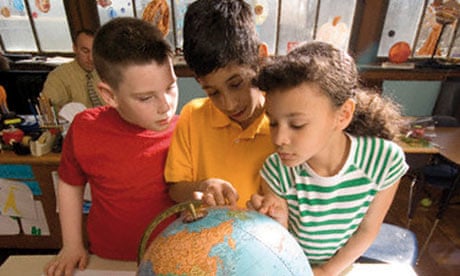I should have titled this post, Five Humongous Mountains to Traverse that Lead to Effective Schools. But anyone who has ever worked within our public school system already knows that the best results only ever come from hard work and massive efforts.
As I think about what is necessary for any school or school system to be truly effective, I keep coming down to these five propositions:
- The purpose of school is learning.
- Teachers facilitate learning.
- #2 (above) requires a great understanding of how students learn.
- Teachers plan lessons that include strategies that are effective in helping students to learn based on the students' learning styles. (That is, based on #3 above.)
- Students learn.
The Purpose of School is Learning
These other purposes are wonderful and they help to make "school" a welcoming place. They give our students a sense of being part of the community and they teach our students that the world is full of opportunities. Still, I believe that the true purpose of school is learning. It's not grades, it's not sports, it's not standing-in-lines and doing-what-you're-told and putting-your-name-in-the-upper-right-hand-corner-of-the-page. The purpose of school is learning.
Teachers Facilitate Learning
Some teachers feel that their job is to teach and their students' jobs are to learn. I believe that teachers' main job is to facilitate learning. If students aren't learning, then what's the point--what are we doing day in and day out? Teaching is (of course) a big part of the job, but if we believe that the purpose of school is learning (see #1 above), then we must believe that student learning is a crucial part of every teacher's responsibility.
The difficulty in traversing this mountain is nestled in the fact that we can't force anybody to do anything. If we have a student (or many students) who refuse to accept the opportunity for learning we (as teachers) are limited in our ability to make this happen. Yet, I would ask, What does a good parent do when her child refuses to go to sleep at bedtime? Does she give up? Does she allow the child to do that which she knows is not in his best interests? No. She reads on to my next proposition [!] .
Understanding How Students Learn
Let's face it...the first two mountains were molehills relative to mountain #3. In fact, I would guess that 90% of teachers are in full agreement with the first two propositions. It is this third proposition in which our journey across toward effective schools really begins to get difficult. Indeed, we have some great teachers who have been teaching for over ten and 20 years who still struggle with this question: How Do Students Learn?
From my point of view, I believe that a full understanding of how students learn requires formal training (or professional development) and experience. No new teacher is fully prepared for the job of teaching, because a new teacher cannot fully understand how students learn without having the experience of interacting with students and making instructional decisions based on those interactions.
If teachers are to succeed in facilitating learning, they must have a working knowledge of how students learn. Hence, my third proposition is likely to be the biggest barrier to effective schools. It is hard for individual teachers to gain the volume of knowledge needed to be very successful on this front; and it takes to time and experience for teachers to use and to fine tune this knowledge. I believe that most of our good teachers are perpetually improving their skills at understanding how students learn. Teacher that do not view this skill as necessary will forever be only marginally effective and will prevent our public schools from achieving their primary objective: Learning.
Use Knowledge of How Students Learn to Plan Effective Lessons with Effective Strategies
This step goes hand-in-hand with #3 (above). In practice, teachers gain an understanding of their students, search for strategies and activities that they feel would be engaging for their students, and then plan their lessons to incorporate their strategies and activities. After teaching the lesson, the teacher evaluates its effectiveness and (perhaps) makes some adjustments for the next time that this lesson is taught.
Matching effective strategies to the learning abilities of the students is difficult, complex work. Indeed, this is the hard part of teaching and a major stumbling block in our efforts to be as effective as we can be. This is where the "science" of teaching appears to become much more of an "art". It is where individual teachers interact with individual students. This complex work (in my opinion) requires teachers to work in groups and in Professional Learning Communities (PLCs) to gain the knowledge and experiences from many professionals in order to build on each teacher's knowledge and experience.
Students Learn
The end result successfully completing steps 1 through 4 is student learning. For some schools, this finish line far from view and much work is needed to begin to see this end result. For others, this goal is well within view and is getting closer each school year.
The first step to any problem is identifying the problem and then to identify a path to solving the problem. These five steps will definitely lead to effective schools. Achieving these five steps requires significant effort. We have to be a team of teachers and administrators and researchers and parents and community. All of our schools can be effective schools.
Our students deserve nothing less than our collective best.



I love your statement, especially the part that is missing. it never talks about just covering the curriculum. It is about the LEarning.
ReplyDeleteThanks Mita. Creating and maintaining effective schools is hard work. Possible, but hard work.
DeleteIts a great pleasure reading your post.Its full of information I am looking for and I love to post a comment that "The content of your post is awesome" Great work. Effective dog training tips to get your dog attention
ReplyDelete